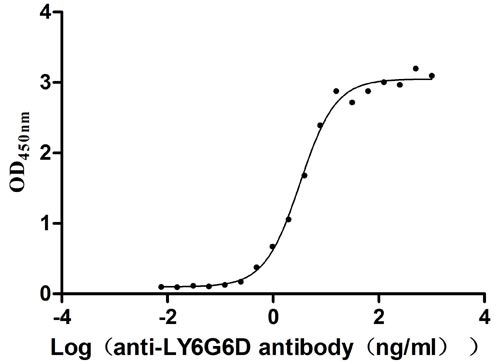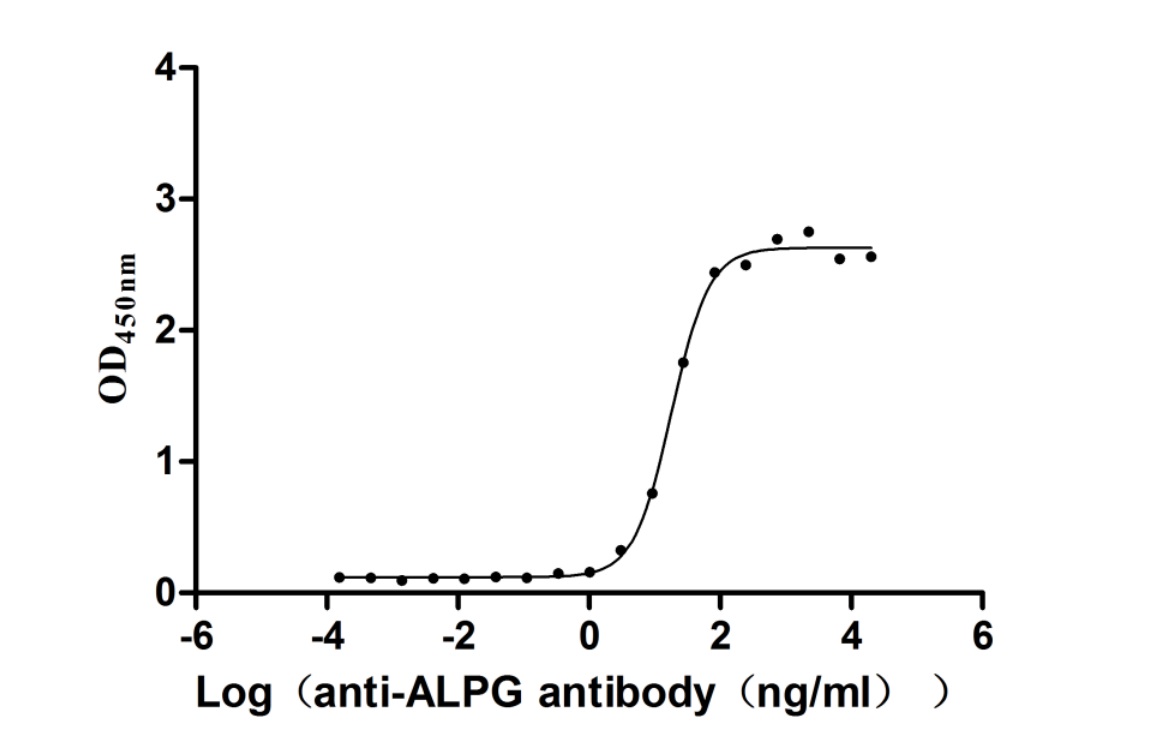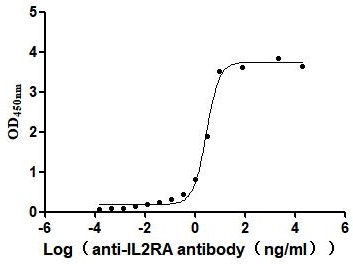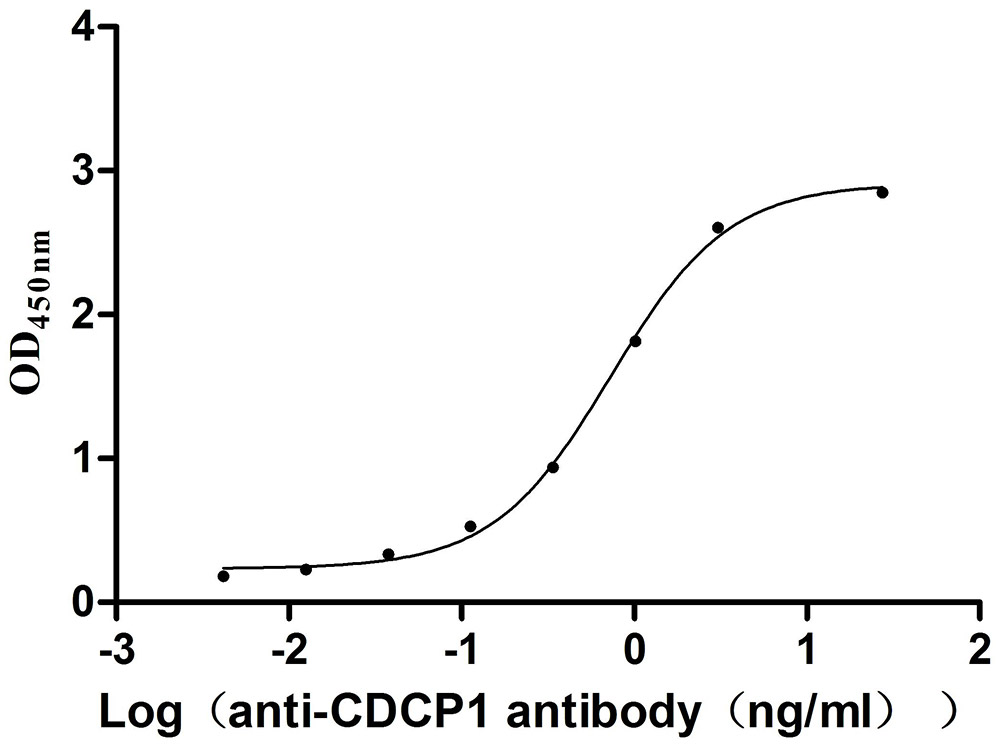Recombinant Mouse Dicarboxylate carrier SLC25A8 (Ucp2)
-
中文名称:小鼠Ucp2重组蛋白
-
货号:CSB-YP025555MO
-
规格:
-
来源:Yeast
-
其他:
-
中文名称:小鼠Ucp2重组蛋白
-
货号:CSB-EP025555MO
-
规格:
-
来源:E.coli
-
其他:
-
中文名称:小鼠Ucp2重组蛋白
-
货号:CSB-EP025555MO-B
-
规格:
-
来源:E.coli
-
共轭:Avi-tag Biotinylated
E. coli biotin ligase (BirA) is highly specific in covalently attaching biotin to the 15 amino acid AviTag peptide. This recombinant protein was biotinylated in vivo by AviTag-BirA technology, which method is BriA catalyzes amide linkage between the biotin and the specific lysine of the AviTag.
-
其他:
-
中文名称:小鼠Ucp2重组蛋白
-
货号:CSB-BP025555MO
-
规格:
-
来源:Baculovirus
-
其他:
-
中文名称:小鼠Ucp2重组蛋白
-
货号:CSB-MP025555MO
-
规格:
-
来源:Mammalian cell
-
其他:
产品详情
-
纯度:>85% (SDS-PAGE)
-
基因名:
-
Uniprot No.:
-
别名:Ucp2; Slc25a8; Mitochondrial uncoupling protein 2; UCP 2; Solute carrier family 25 member 8; UCPH
-
种属:Mus musculus (Mouse)
-
蛋白长度:Full length protein
-
表达区域:1-309
-
氨基酸序列MVGFKATDVPPTATVKFLGAGTAACIADLITFPLDTAKVRLQIQGESQGLVRTAASAQYR GVLGTILTMVRTEGPRSLYNGLVAGLQRQMSFASVRIGLYDSVKQFYTKGSEHAGIGSRL LAGSTTGALAVAVAQPTDVVKVRFQAQARAGGGRRYQSTVEAYKTIAREEGIRGLWKGTS PNVARNAIVNCAELVTYDLIKDTLLKANLMTDDLPCHFTSAFGAGFCTTVIASPVDVVKT RYMNSALGQYHSAGHCALTMLRKEGPRAFYKGFMPSFLRLGSWNVVMFVTYEQLKRALMA AYQSREAPF
-
蛋白标签:Tag type will be determined during the manufacturing process.
The tag type will be determined during production process. If you have specified tag type, please tell us and we will develop the specified tag preferentially. -
产品提供形式:Lyophilized powder
Note: We will preferentially ship the format that we have in stock, however, if you have any special requirement for the format, please remark your requirement when placing the order, we will prepare according to your demand. -
复溶:We recommend that this vial be briefly centrifuged prior to opening to bring the contents to the bottom. Please reconstitute protein in deionized sterile water to a concentration of 0.1-1.0 mg/mL.We recommend to add 5-50% of glycerol (final concentration) and aliquot for long-term storage at -20℃/-80℃. Our default final concentration of glycerol is 50%. Customers could use it as reference.
-
储存条件:Store at -20°C/-80°C upon receipt, aliquoting is necessary for mutiple use. Avoid repeated freeze-thaw cycles.
-
保质期:The shelf life is related to many factors, storage state, buffer ingredients, storage temperature and the stability of the protein itself.
Generally, the shelf life of liquid form is 6 months at -20°C/-80°C. The shelf life of lyophilized form is 12 months at -20°C/-80°C. -
货期:Delivery time may differ from different purchasing way or location, please kindly consult your local distributors for specific delivery time.Note: All of our proteins are default shipped with normal blue ice packs, if you request to ship with dry ice, please communicate with us in advance and extra fees will be charged.
-
注意事项:Repeated freezing and thawing is not recommended. Store working aliquots at 4°C for up to one week.
-
Datasheet :Please contact us to get it.
靶点详情
-
功能:UCP are mitochondrial transporter proteins that create proton leaks across the inner mitochondrial membrane, thus uncoupling oxidative phosphorylation from ATP synthesis. As a result, energy is dissipated in the form of heat.
-
基因功能参考文献:
- UCP2 regulates daily rhythms of insulin secretion in MIN6 cells and isolated islets from male mice. PMID: 28702331
- Study provides evidence that UCP2 plays a protecting role against LPS by regulating the balance between autophagy and apoptosis of cardiomyocytes, and by which mechanisms, it may contribute to homeostasis of cardiac function and cardiomyocytes activity. PMID: 29547569
- UCP2 inhibits myointimal hyperplasia after vascular injury, probably through suppressing nuclear factor-kappaB-dependent smooth muscle cell proliferation and migration. PMID: 29025747
- Upregulation of UCP2 conferred protective effects to the stressed beta-cell through mechanisms not directly associated with superoxide production. PMID: 28755631
- UCP2-dependent modulations have a major impact on cardiac electrophysiology. PMID: 28370799
- UCP2 regulates embryonic neurogenesis through reactive oxygen species-mediated Yap alternation, thus shedding new sight on mitochondrial metabolism involved in embryonic neurogenesis. PMID: 28276603
- Data demonstrate that UCP2 controls pancreas development through the ROS-AKT signaling pathway. PMID: 29079704
- UCP2 has two glycine-rich motifs, motif 1: EGIRGLWKG (170-178) and a Walker A-like motif 2: EGPRAFYKG (264-272). These motifs seem to be important for the function of UCP2. UCP2/K177E- or UCP2/G174L-expressed cells did not induce enlarged cell shapes. UCP2/K177E and UCP2/G174L produced functional incompetence of the glycine-rich motif 1. Senescent-like cells significantly decreased the mitochondrial membrane potentials. PMID: 26864036
- our findings reveal that UCP2 regulates inflammation responses in astrocytes and plays an important role in the pathogenesis of depression and that UCP2 may be a promising therapeutic target for depression. PMID: 27566281
- attenuates renal ischemia-reperfusion injury, probably by reducing cell apoptosis through protection of autophagy PMID: 28424210
- UCP-2 prevents angiotensin-II-induced abdominal aortic aneurysm in apolipoprotein E-knockout mice via antioxidant and antiapoptotic activities. PMID: 28683125
- This study demonstrating a FABP4-UCP2 axis with the potential to modulate the microglial inflammatory response. PMID: 28214555
- The miR-133a-UCP2 pathway participates in inflammatory bowel disease (IBD) by altering downstream inflammation, oxidative stress and markers of energy metabolism, which provides novel clues and potential therapeutic targets for IBD. PMID: 28104982
- PPARgamma inhibited PDGF-BB-induced ROS in VSMCs by upregulating UCP2 expression. PMID: 27144886
- these data offer a novel pathway whereby FABP4/aP2 regulates macrophage redox signaling and inflammasome activation via control of UCP2 expression. PMID: 27795298
- Ucp2 affects glutathione metabolism by regulating hepatic efflux of glutathione. Nrf2 deficiency may not aggravate oxidative stress in Ucp2-deficient mice. PMID: 27453341
- Induction of autophagy by SCFAs required PPARgamma stimulation of Uncoupling Protein 2 (UCP2) expression that was associated with reduced intracellular ATP levels and activation of PRKAA1/AMPK (protein kinase, AMP-activated, alpha 1 catalytic subunit). In addition, elimination of gut flora by chronic antibiotic treatment diminished basal hepatic autophagy in mice suggesting that gut microbiota can regulate hepatic auto... PMID: 27773823
- UCP2 induces protective effects on ROS and ATP levels during aging. Additionally, the results suggest an imbalance in hematopoiesis because of the lack of UCP2. PMID: 27544660
- Intriguingly, on the molecular level this acceleration in aging predominantly is accompanied by increased levels of circulating IGF-1 in Ucp2(-/-) mice, hinting at a crosstalk between UCP2 and the classical Insulin/IGF-1 signaling aging pathway. PMID: 27364833
- PPARbeta/PPARgamma activation restored the LPS-induced endothelial dysfunction by upregulation of UCP2, with the subsequent alleviation of ER stress and NADPH oxidase activity, thus reducing intracellular reactive oxygen species production and increasing nitric oxide bioavailability. PMID: 27179975
- Apart from their slower growth, pancreatic stellate cells of UCP2-/- mice displayed no functional abnormalities. PMID: 27919855
- In the brains of UCP2-knockout mice, there was a decrease in glutamate, glutamine and GABA. PMID: 27401256
- Loss of UCP2 impairs cold-induced non-shivering thermogenesis by promoting a shift toward glucose utilization in brown adipose tissue. PMID: 28130074
- Increased expression of UCP2 significantly reduced apoptosis during the critical developmental period resulting in elevated numbers of retinal ganglion cells in the adult. PMID: 26846222
- Study shows that mitochondrial location controlled by UCP2 is relevant for adaptive responses of neurons in cortical and hippocampal neurons and are relevant to perinatal hypoxia-triggered circuit adaptations PMID: 26777666
- Study shows that glucose load results in mitochondrial fission and reduced reactive oxygen species in ventromedial nucleus of the hypothalamus neurons mediated by dynamin-related peptide 1 (DRP1) under the control of uncoupling protein 2 (UCP2). PMID: 26919426
- UCP2 modulating role in mitochondrial calcium uptake PMID: 26849136
- Blocking UCP2 expression attenuates cardiac hypertrophy induced by pressure overload PMID: 26196155
- UCP2 knockout suppresses mouse skin carcinogenesis. PMID: 25784177
- A newly identified functional variant (rs1626521) in UCP-3 affects postprandial gastric functions and satiety and may contribute to weight gain and alter human mitochondrial function. PMID: 25755013
- while the lack of UCP2 has no acute effect on body temperature, UCP2 may inhibit rapid improvements in defense against cold, in contrast to UCP1, whose main function is to promote thermogenesis. PMID: 24952267
- high UCP2 levels allow better utilization of fatty acid oxidation resulting in a beneficial effect on mitochondrial function in heart, postponing systemic lactic acidosis and resulting in longer lifespan in these mice. PMID: 24945157
- Results suggest that hippocampal UCP2 is essential for cognitive function and the resistance to anxiety of mice, but not required for the beneficial effects of exercise PMID: 25003714
- Free fatty acid recognizes UCP2 at a peripheral site via electrostatic interaction. Flipping ionized fatty acid by UCP2 is required for UCP2-mediated H+ transport in mitochondria. PMID: 25127353
- long-term exposure to CT-1-CP could lead to the alteration in the expression of sarcomeric alpha-actin, alpha-actinin and mitochondrial UCP2. PMID: 25480572
- Therefore, SET overexpression in HEK293 cells promotes mitochondrial fission and reduces autophagic flux in apparent association with up-regulation of UCP2 and UCP3. PMID: 25656576
- The FABP-FFA equilibrium controls UCP2 expression. PMID: 25582199
- UCP2 regulates the NLRP3 inflammasome by inducing the lipid synthesis pathway in macrophages. PMID: 25574840
- In ApoE-knockout mice, there was a progressive reduction of UCP-2 levels and an increase in vascular damage. PMID: 25077985
- Knock-out of Ucp2 exacerbated salt-induced cardiovascular and renal remodeling and enhanced oxidative stress. PMID: 24833471
- UCP2 may act as a powerful influence on hepatic regeneration and cell death in the steatotic liver. PMID: 24320727
- L. donovani infection resulted in degradation of USF1 thereby facilitating SREBP2 binding which in turn assisted in the association of Sp1 with the promoter ultimately culminating in elevated transcription of UCP2. PMID: 24417972
- UCP2 is present in cells with highly proliferative potential, which have a glycolytic type of metabolism as a common feature, whereas UCP4 is strongly associated with non-proliferative highly differentiated neuronal cells PMID: 24523901
- Mitochondrial retrograde signaling mediated by UCP2 inhibits cancer cell proliferation and tumorigenesis. PMID: 24853548
- miR-30e/UCP2 axis has an important role in mediating TGF-beta1-induced epithelial-mesenchymal transition and kidney fibrosis. PMID: 23515048
- Induction of UCP2 in pulmonary macrophages is an early response to hyperoxia-associated lung injury. PMID: 23905971
- Mitochondrial UCP2 plays a critical role in protecting splenocytes from oxidative stress-induced apoptosis during pathogen activation. PMID: 24291389
- TRPV1 activation might protect against hyperglycemia-induced endothelial dysfunction through a mechanism involving the PKA/UCP2 pathway. PMID: 23607427
- UCP2 is upregulated in the absence of NLRP3 and ASC. PMID: 23988448
- Increased mitochondrial membrane potential causes vascular remodeling in UCP2-deficient mice, partially via increased production of reactive oxygen species. PMID: 23590303
显示更多
收起更多
-
亚细胞定位:Mitochondrion inner membrane; Multi-pass membrane protein.
-
蛋白家族:Mitochondrial carrier (TC 2.A.29) family
-
组织特异性:Highest in white adipose tissue, also detected in brown adipose tissue, heart and kidney. 4-6 times higher levels are detected in ob/ob and db/db mice.
-
数据库链接:
KEGG: mmu:22228
STRING: 10090.ENSMUSP00000120967
UniGene: Mm.171378
Most popular with customers
-
Recombinant Human Delta-like protein 3 (DLL3), partial (Active)
Express system: Mammalian cell
Species: Homo sapiens (Human)
-
Recombinant Macaca mulatta Microtubule-associated protein tau (MAPT) (Active)
Express system: Mammalian cell
Species: Macaca mulatta (Rhesus macaque)
-
Recombinant Human Microtubule-associated protein tau (MAPT) (Active)
Express system: Mammalian cell
Species: Homo sapiens (Human)
-
Recombinant Human Lymphocyte antigen 6 complex locus protein G6d (LY6G6D) (Active)
Express system: Yeast
Species: Homo sapiens (Human)
-
Recombinant Human Alkaline phosphatase, germ cell type (ALPG) (Active)
Express system: Mammalian cell
Species: Homo sapiens (Human)
-
Recombinant Human Interleukin-2 receptor subunit alpha (IL2RA), partial (Active)
Express system: Mammalian cell
Species: Homo sapiens (Human)
-
Recombinant Mouse CUB domain-containing protein 1 (Cdcp1), partial (Active)
Express system: Mammalian cell
Species: Mus musculus (Mouse)
-
Recombinant Human Cytotoxic and regulatory T-cell molecule (CRTAM), partial (Active)
Express system: Mammalian cell
Species: Homo sapiens (Human)


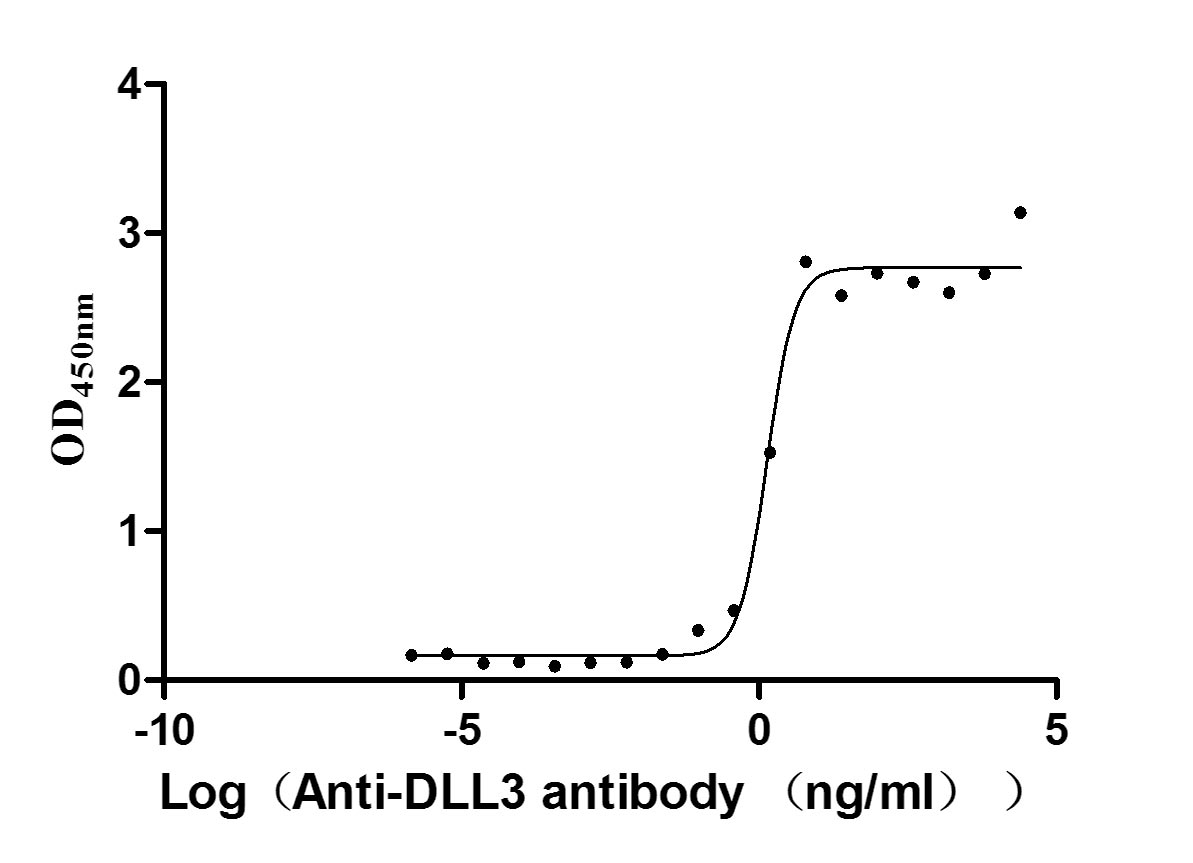
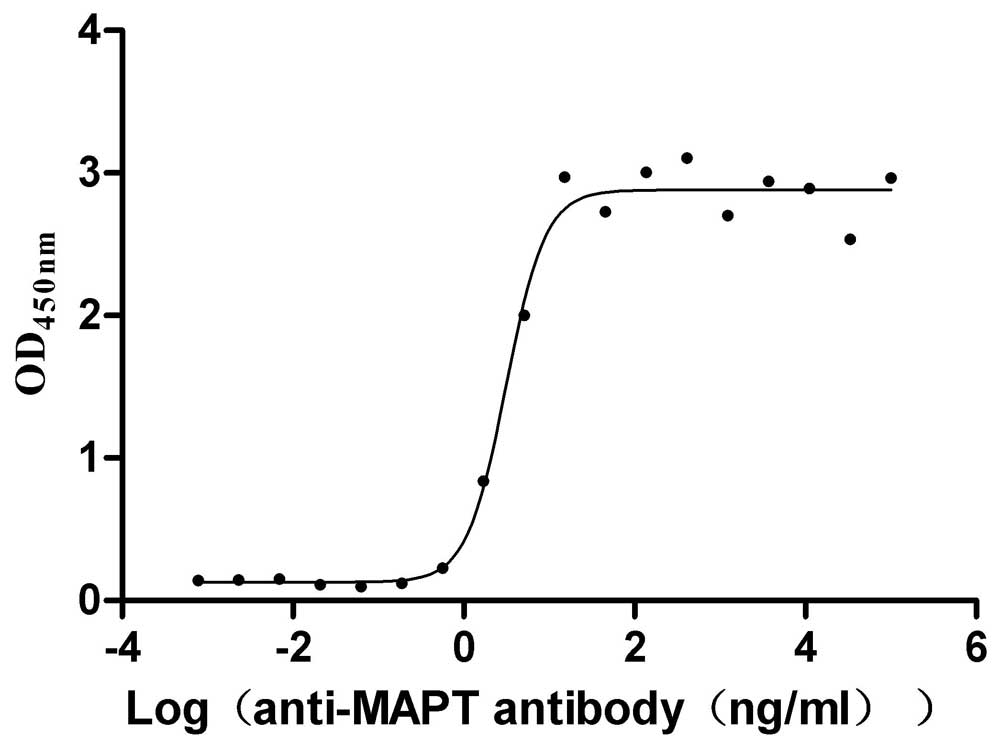
-AC1.jpg)
